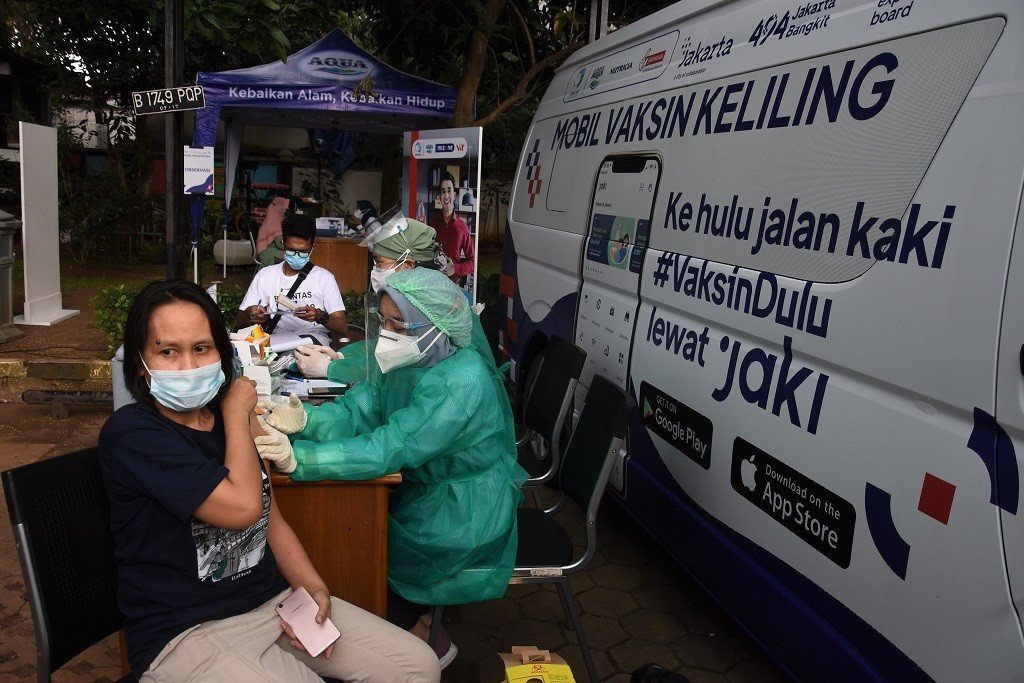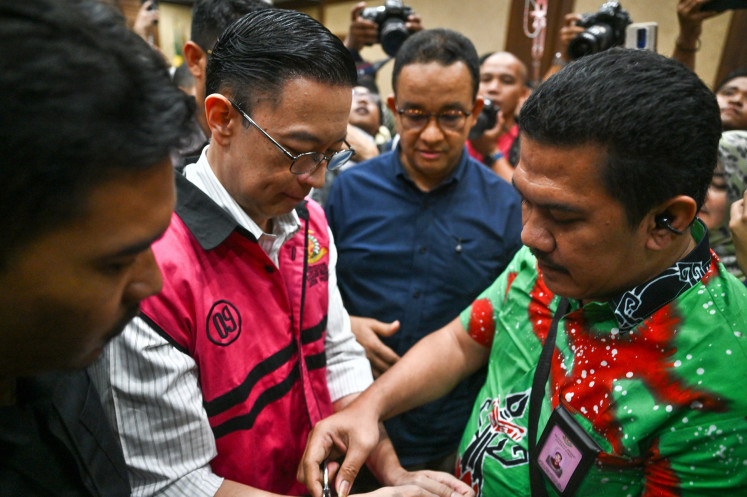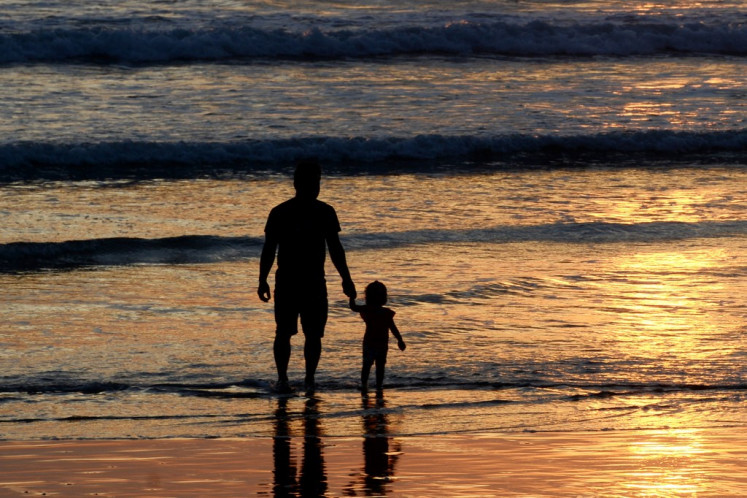Popular Reads
Top Results
Can't find what you're looking for?
View all search resultsPopular Reads
Top Results
Can't find what you're looking for?
View all search resultsBooster vaccine rollout a sure recipe for boosting inequality
As the government’s own data shows, the benefits of the vaccination rollout have not been equally enjoyed across the nation.
Change text size
Gift Premium Articles
to Anyone

In the run-up to the National Games (PON) in October, the government worked hard to make sure that as many people as possible in Papua and West Papua provinces, hosts of the biennale event, get their COVID-19 vaccines. It never got anywhere near the published target of a 70 percent vaccination rate. In the end, the vaccine rollout in the two easternmost provinces focused on three regencies and one city where the Games’ venues were located.
PON XX was still considered a huge success, held at a time when the nation was struggling to bring down COVID-19 infection rates. The vaccination program in the two provinces allowed many Papuans, as well as visitors who were already fully vaccinated, to watch their favorite sports and athletes fighting for the honor of their respective provinces.
Fast forward three months to now, both Papua and West Papua rank among the lowest-ranked provinces in the country when it comes to vaccination rates. Once the Games was over, apparently, Papuans were all but forgotten in the national vaccination program.
As of this weekend, the number of people in Papua who have received their first dose is 28 percent of the target, and only 20 percent have gotten their second, according to Health Ministry figures. West Papua is doing better, though is still well below the national level, with 52 percent and 34 percent, respectively, for the first and second injections. Aceh, Indonesia’s westernmost province, and Maluku, also rank among the lowest four of all 34 provinces.
Yet the government has been touting Indonesia’s national vaccination program as a success, with 156 million people receiving the first dose and 110 million their second, giving a vaccination rate of 75 percent and 53 percent for their first and second injections of the targeted 208 million people.
So confident with this success that Indonesia is now ready to formally roll out a program for the third injection as a booster to strengthen the effectiveness of the first two doses, beginning in the new year.
As the government’s own data shows, the benefits of the vaccination rollout have not been equally enjoyed across the nation. Jakarta tops the list in the vaccination rate, with 136 percent of the target receiving their first dose and 123 percent their second, while Bali comes second with 103 and 91 percent, respectively.
This raises the question of whether the booster vaccine rollout would further increase the inequality that we are already seeing caused by the pandemic and the economic downturn. Much has been written about the widening gap during the pandemic, between the rich and poor, between rural and urban areas, and between Java and Bali on the one hand and the rest of the archipelago on the other.
When it comes to vaccines, understandably, priorities have been given to areas hardest hit by the COVID-19 virus, including Jakarta, and all provinces on Java and Bali. Giving them top priority was acceptable, just as it was acceptable to give Papuans priority in the runup to PON XX.
But allowing a booster vaccine rollout when barely half of the nation have gotten their second injection raises moral and ethical questions. If the government claims that vaccination is the key to economic recovery, it follows that those who are already vaccinated are better positioned to recover, while those unvaccinated would be left behind and more exposed to the virus.
The World Health Organization has appealed to rich countries to postpone booster vaccinations until at least 40 percent of the population in all countries are vaccinated. Most countries ignored the WHO and are going ahead with their booster programs. Indonesia will begin next week.
The WHO argues that given the limited availability of vaccines globally, giving booster vaccines would deprive poor countries of access to vaccines. It also warns that vaccine inequality would prolong the COVID-19 pandemic.
President Joko “Jokowi” Widodo spoke on behalf of developing countries when he made an impassionate plea for rich countries to help reduce vaccine inequality during a meeting with other leaders of the Group of 20 most wealthy countries in the world.
At home, the President faces increasing pressure from those who have received both injections to roll out the booster program amid reports that the new Omicron variant could render the early vaccines ineffective without the third injection.
Officially, booster vaccines have already been given to health workers, but unofficially and quietly, many people in Jakarta and Java have received their third jab. Shots have already been available at commercial rates rather than for free.
The national vaccination rate has not moved as rapidly as the government wished for various reasons, from the slow arrival of imported vaccines to the problems in distributing and administering the vaccines, as well resistance from people skeptical about the vaccine program. When rolled out in January, the government hoped to complete the vaccination program — meaning 208 million people getting both jabs — by the end of 2021. With the year about to close, we are only halfway to that target.
But is this a good enough reason for the government to begin rolling out booster vaccines?
“Recover together, recover stronger”; Indonesia’s motto of its G20 presidency beginning in December would ring hollow unless we address the vaccine inequality at home.
The booster vaccine policy would not only deprive many people, including those in Papua and Aceh, of their vaccine rights, it would also be a sure recipe for boosting greater inequality, with all its social, economic and political consequences down the road.
***
The writer is a senior editor at The Jakarta Post.










